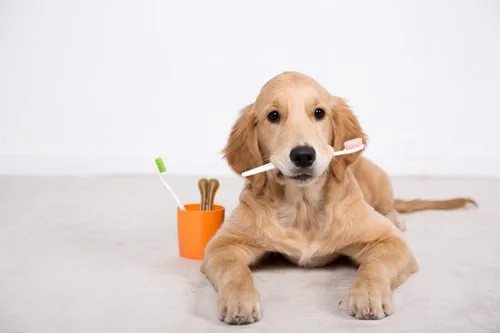Why Does My Dog Have Bad Breath? Here’s How to Help
If you’ve ever been close to your dog and thought, “Why does my dog have bad breath?”, you’re not alone. Bad breath in dogs, medically known as halitosis, is a common concern among pet owners. At Warrick Veterinary Clinic in Warrick County, IN, we understand the importance of your dog’s oral health. This blog aims to explore the reasons behind bad breath in dogs and how you can help. Remember, for specific concerns or to request an appointment, call us at (812) 897-4855 or request an appointment online.

Identifying the Causes of Bad Breath in Dogs
Oral Health Issues
One of the primary causes of bad breath in dogs is poor oral hygiene. Just like humans, dogs can develop plaque and tartar, leading to gum disease and tooth decay. Regular dental check-ups at Warrick Veterinary Clinic can help identify these issues early.
Diet and Digestive Issues
Sometimes, what your dog eats can contribute to bad breath. Certain foods might not agree with your dog’s digestive system, leading to unpleasant odors. Additionally, if your dog has a habit of eating non-food items, this could also be a culprit.
The Importance of Regular Dental Care
Routine dental care is essential in maintaining your dog’s oral health and preventing bad breath. Regular brushing, dental treats, and professional cleanings are effective ways to keep your dog’s teeth and gums healthy. For advice on dental care routines, feel free to contact Warrick Veterinary Clinic.
When to Consult a Veterinarian
If your dog’s bad breath persists despite good oral hygiene, it might be time to consult a veterinarian. Persistent bad breath can be a sign of underlying health issues that require professional attention. The team at Warrick Veterinary Clinic is always ready to assist you. If a professional dental cleaning is recommended, your dog is placed under anesthesia and their teeth and gums are thoroughly cleaned.
Home Care Tips for Managing Bad Breath
Managing your dog’s bad breath at home involves a combination of good oral hygiene practices, diet management, and awareness of their overall health. Here are some detailed steps to help you keep your dog’s breath fresher:
- Brushing Your Dog’s Teeth: Regular brushing is vital in preventing the buildup of plaque and tartar, common causes of bad breath. Use a toothbrush designed for dogs and pet-safe toothpaste. Aim to brush your dog’s teeth daily, or at least several times a week.
- Dental Chews and Toys: Dental chews and toys are not only enjoyable for your dog but also help in cleaning their teeth. They work by mechanically scraping off plaque as your dog chews. Make sure to choose products specifically designed for dental hygiene.
- Choosing the Right Food: Some dog foods are specially formulated to support dental health. These can reduce plaque and tartar buildup. Consult with a veterinarian at Warrick Veterinary Clinic for recommendations tailored to your dog’s needs.
- Water Additives and Dental Supplements: There are various water additives and supplements available that help improve dental health and freshen breath. They can reduce bacteria in your dog’s mouth and are an easy addition to their daily routine.
- Keep an Eye on Unusual Eating Habits: If your dog is prone to eating non-food items or has sudden changes in eating habits, this could affect their breath. Monitor their behavior and consult with our team if you notice anything unusual.
- Regular Health Check-Ups: Sometimes, bad breath is a sign of an underlying health condition. Regular health check-ups at Warrick Veterinary Clinic can help catch and manage these issues early.
The Role of Diet in Preventing Bad Breath
A balanced diet plays a crucial role in your dog’s overall health, including oral hygiene. Foods that promote good dental health can help reduce the risk of bad breath. Speak to our veterinarians at Warrick Veterinary Clinic for dietary recommendations.
Understanding the Impact of Underlying Health Issues
Sometimes, bad breath is a sign of more significant health problems like kidney disease or diabetes. Understanding these conditions and their symptoms can help in early detection and treatment.
Kidney Disease and Oral Health
Bad breath can sometimes indicate kidney disease. If you notice a change in your dog’s breath, along with other symptoms like increased drinking or urination, consult our veterinarians.
Diabetes and Oral Hygiene
Similarly, diabetes can affect your dog’s breath. A fruity or sweet smell in your dog’s breath might be a symptom of diabetes, and should prompt a visit to Warrick Veterinary Clinic.
Ensuring Your Dog’s Healthy Smile
Bad breath in dogs is a common issue, but it’s often a sign that something more may be going on. Paying attention to your dog’s oral health and consulting with a veterinarian are key steps in addressing this problem. At Warrick Veterinary Clinic in Warrick County, IN, we’re dedicated to helping you keep your dog healthy and happy. For more information or to schedule an appointment, call us at (812) 897-4855 or request an appointment online.
